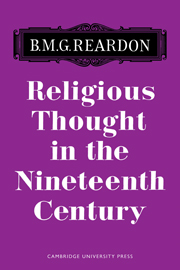Book contents
- Frontmatter
- Preface
- Contents
- Introduction
- PART I EUROPEAN
- PART II BRITISH AND AMERICAN
- 1 Coleridge
- 2 F. D. Maurice
- 3 Newman
- 4 Mansel
- 5 J. S.Mill
- 6 Benjamin Jowett and Essays and Reviews
- 7 Matthew Arnold
- 8 Scott Holland and Lux Mundi
- 9 The British Hegelians
- 10 Emerson
- 11 Josiah Royce
- 12 William James
- Index of Works Cited
- Frontmatter
- Preface
- Contents
- Introduction
- PART I EUROPEAN
- PART II BRITISH AND AMERICAN
- 1 Coleridge
- 2 F. D. Maurice
- 3 Newman
- 4 Mansel
- 5 J. S.Mill
- 6 Benjamin Jowett and Essays and Reviews
- 7 Matthew Arnold
- 8 Scott Holland and Lux Mundi
- 9 The British Hegelians
- 10 Emerson
- 11 Josiah Royce
- 12 William James
- Index of Works Cited
Summary
John Henry Newman was born in 1801, the eldest child of a London banker. At first educated at home, he was sent at the age of 7 to a school at Ealing where he came under Calvinist influence and, as he himself relates, experienced a conversion both deep and lasting. In December 1810 he entered Trinity College, Oxford, but his academic achievement was undistinguished until his election to an Oriel fellowship in 1822. Ordained priest a year later, he became vicar of the university church, St Mary's, in 1828. So began a period in his life in which his name and fame spread from Oxford throughout England, but it was in the then narrow confines of the university, and above all from the pulpit of his parish church, that his influence was most effectively exerted. His religious outlook had changed from a moderate evangelicalism to the latitudinarianism characteristic of the Oriel intellectuals. But this liberal phase was not to last. From his studies in the early Church Fathers the conviction grew in him that antiquity was ‘the true exponent of the doctrines of Christianity and the basis of the Church of England’. In 1832 he travelled abroad with his friend Richard Hurrell Froude, also a former Oriel fellow, touring the Mediterranean and visiting Rome. It was while his ship was becalmed in the Straits of Bonifacio that he wrote the well-known hymn, ‘Lead, kindly Light’.
- Type
- Chapter
- Information
- Religious Thought in the Nineteenth Century , pp. 269 - 287Publisher: Cambridge University PressPrint publication year: 1966

